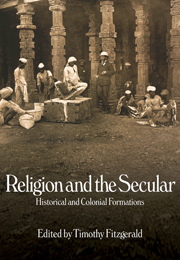Book contents
- Frontmatter
- Dedication
- Contents
- Acknowledgements
- Contributors
- Introduction
- 1 Dialectics of conversion: Las Casas and Maya colonial Congregación
- 2 A higher ground: the secular knowledge of objects of religious devotion
- 3 Secularizing the land: the impact of the Alaskan Native Claims Settlement Act on indigenous understandings of land
- 4 The formative process of State Shinto in relation to the Westernization of Japan: the concept of ‘religion’ and ‘Shinto’
- 5 Religious and secular in the Vietnam War: the emergence of highland ethno-nationalism
- 6 Colonialism all the way down? Religion and the secular in early modern writing on south India
- 7 Understanding politics through performance in colonial and postcolonial India
- 8 Real and imagined: imperial inventions of religion in colonial southern Africa
- 9 Religion in modern Islamic thought and practice
- 10 Rudolf Otto, cultural colonialism and the ‘discovery’ of the holy
- 11 Encompassing Religion, privatized religions and the invention of modern politics
- 12 Colonialism and the myth of religious violence
- Index
10 - Rudolf Otto, cultural colonialism and the ‘discovery’ of the holy
- Frontmatter
- Dedication
- Contents
- Acknowledgements
- Contributors
- Introduction
- 1 Dialectics of conversion: Las Casas and Maya colonial Congregación
- 2 A higher ground: the secular knowledge of objects of religious devotion
- 3 Secularizing the land: the impact of the Alaskan Native Claims Settlement Act on indigenous understandings of land
- 4 The formative process of State Shinto in relation to the Westernization of Japan: the concept of ‘religion’ and ‘Shinto’
- 5 Religious and secular in the Vietnam War: the emergence of highland ethno-nationalism
- 6 Colonialism all the way down? Religion and the secular in early modern writing on south India
- 7 Understanding politics through performance in colonial and postcolonial India
- 8 Real and imagined: imperial inventions of religion in colonial southern Africa
- 9 Religion in modern Islamic thought and practice
- 10 Rudolf Otto, cultural colonialism and the ‘discovery’ of the holy
- 11 Encompassing Religion, privatized religions and the invention of modern politics
- 12 Colonialism and the myth of religious violence
- Index
Summary
Speaking at Rudolf Otto's graveside service, Heinrich Frick recalled “Otto's own description of how he had once, in remarkable circumstances, encountered the power of the Holy with utter clarity”:
It was on his journey through North Africa, and he found himself in a poor Moroccan synagogue on Yom Kippur, just at the climax of the ceremony. What a contrast! Here was a pathetic, impoverished building with a tiny gathering of equally pathetic human beings (Existenzen) – and in this context the dazzling hymn of the trisagion, the seraphim's song of praise from the prophet Isaiah: “Holy, holy, holy is the Lord of hosts; the whole earth is full of his glory.” By the flickering light of the candles the full majesty of the Lord of heaven and earth seemed to be present in the midst of our poverty and paltriness. Afterwards Rudolf Otto experienced the Holy in other religions, too, at more magnificent sacred places and in higher cultures. But it seemed to him that the contrast [between the setting and song in the synagogue] made that single impression the most shattering of all. Later he identified that experience as the precise moment (Stunde) when he discovered his understanding of the Holy, and he described it in moving words.
(Frick 1937a: 5-6)- Type
- Chapter
- Information
- Religion and the SecularHistorical and Colonial Formations, pp. 193 - 210Publisher: Acumen PublishingPrint publication year: 2007

